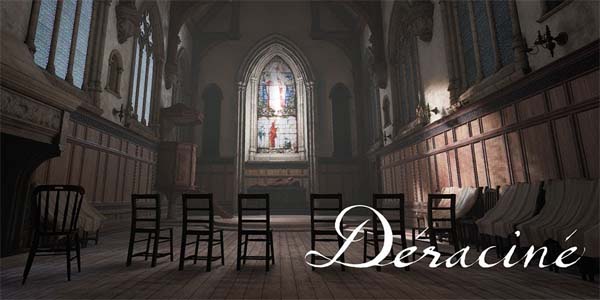
I've been enjoying the PS5 and the PSVR2. In fact, I have a sneaking suspicion that when all is said and done, the PS5 might end up being my second favorite console after the PS2. Its novel controller has even rekindled a long-lost love of Gran Turismo. The PSVR2 has been a bit more of a mixed bag. The few games that I've played on it have been good. The set itself is an improvement over the previous hardware in almost every way. It has 1 wire to connect to the console instead of the million cables required to get the original PSVR to connect to the console and TV, and the screen is a lot clearer and more vibrant. The only real downside of the physical hardware is that it is not as comfortable to wear as the original PSVR.
The biggest problem with the PSVR2, however, isn't really a problem with the PSVR2 hardware itself. The problem is the lack of things to play on it. It doesn't really have any killer apps at launch. There's a handful of games that are hardly more than tech demos or glorified expansions for other games. The only full games to be playable in VR at launch were Gran Turismo 7 and Resident Evil: Village, which were already a year or 2 old when the PSVR2 released.
Worst of all, however, is that the PSVR2 does not support any of the original PSVR games for PS4. This is despite the fact that the PS5 was always marketed as being fully backwards compatible with PS4 games. I get that the PSVR2 hardware works under totally different principles compared to the original system (using motion-sensing hardware instead of tracking the headset's position with cameras). But that doesn't mean that Sony couldn't have developed an API to translate the inputs from the PSVR2 into commands that PSVR games could understand. In any case, the net effect is that those of us who bought a PSVR2 are stuck with the hardware's limited library and don't have the luxury of the back-catalog of great PSVR titles. That means no Star Wars: Squadrons, no Resident Evil VII, and no Ace Combat 7, among other PS4 VR games.
The PSVR2 is not backwards-compatible with any of the PS4 VR games.
I actually wasn't aware that the PSVR2 wouldn't support PSVR games when I bought the hardware, and I never owned the original PSVR unit. While I was waiting for the PSVR2 hardware to be delivered, I already bought a fancy new flight stick with the expectation that I would be able to play Star Wars: Squadrons and Ace Combat, and I also bought another PS4 game that I never got around to playing because it was only available for VR. That game was FromSoftware's experimental little VR game, Déraciné. And since the PSVR2 wouldn't play these games on the PS5, I had to ask a friend if I could borrow his original PSVR headset so that I could play them.
[More]
e3b1b07f-8bbd-40f8-a921-27206e6479bf|6|3.0
Tags:Deracine, From Software, PS4, VR, PSVR, virtual reality, point-and-click, children, school, orphan, faerie, cat, time travel, horror
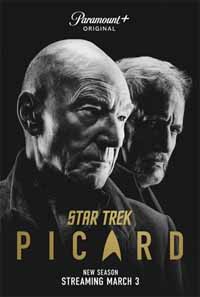 © CBS, Paramount
© CBS, Paramount
I'm not going to wait till the end of the review this time to say this. I want to get it out of the way right up front. Paramount needs to get some actual science fiction writers (preferably ones who have worked on Star Trek in the past) and science and technical consultants into the writing rooms for their Star Trek shows. And furthermore, the TV writers in the room need to listen to those sci-fi writers and consultants. Not only does the second season of Star Trek: Picard fall apart due to sloppy, incoherent plotting, but it also seems painfully unaware of certain parts of Trek canon and also of how metaphor and allegory are supposed to work.
I previously wrote an outline of my ideas for re-writing the first season of Picard to retain all the good ideas, get rid of the bad, and create something that more closely resembles the type of Star Trek that I want to see. But I don't think I can do that for this season of Picard because nothing in this show makes any sense.
I was actually kind of optimistic at the start. The first 2 episodes were actually not bad, and seemed to go out of their way to try to rectify some of the complaints that were levied against season 1. This time around, the Federation is not depicted as racist cowards who are unwilling to help a refugee population fleeing from a natural catastrophe. In fact, they give long speeches about the duty of Starfleet to explore the unknown and about the value of diversity and inclusion. We still see a version of the Federation that is racist and xenophobic, but this time, it's in the form of a parallel reality fascist Confederation. The first episode is even about a starship investigating a strange anomaly in space. This is an OK start. This actually kind of sort of looks like Star Trek.
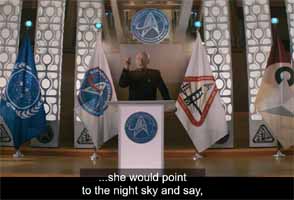 © CBS, Paramount
© CBS, Paramount
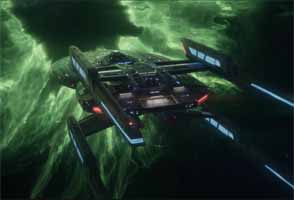 © CBS, Paramount
© CBS, Paramount
Season 2 starts off promising, with the Federation looking more like what I'm used to,
and the opening episode seemingly including an "anomaly of the week".
Problematic developments
But even from this first episode, the cracks in the storytelling are already exposed. Problem number one is that all the important character development happened off-screen between seasons. Rios apparently got over his trauma, went back to Starfleet, and was given a captaincy. He even broke up with Jurati. Good riddance. Seven and Raffi also had a relationship and then a falling-out -- all off-screen. Raffi developed some sort of proxy-parent / mentor relationship with Elnor, who also joined Starfleet, and is somehow already on a deep space assignment less than a year after enlisting. Meanwhile, Larin's husband died, and she's secretly fallen madly in love with Picard, who is now an instructor or headmaster at Starfleet Academy. Soji is an ambassador between the synths and the Federation and isn't involved in season 2 at all, despite having been the lynchpin of the first season.
The character development that happens during season 2 isn't any better. This season Fundamentally changes Picard's character. He was already unrecognizable as the same Jean-Luc Picard from The Next Generation in season 1, but I'm willing to give a pass due to the decades of time in between. People change over decades, especially if their life circumstances have also dramatically changed. Picard went from being a Starfleet captain exploring the galaxy, to sitting around his chateau with his Romulan not-slaves, sipping wine and petting dogs. Fine, I get that he's mellowed since the end of TNG.
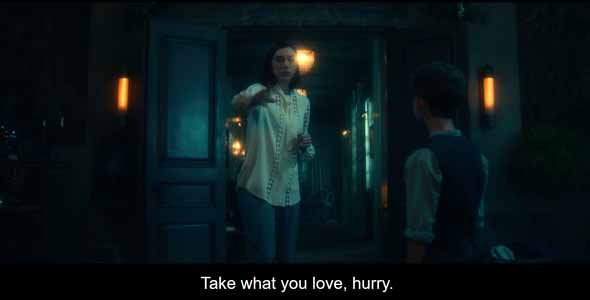 © CBS, Paramount
© CBS, Paramount
Picard's past is ret-conned to include a mentally ill mother and toxic home environment
being the reason he left home for the stars.
But season 2 actually goes back and retcons Picard's entire life in ways that reframe his entire character from TNG. He isn't the consummate explorer who joined Starfleet because of a genuine love of science and discovery. Now, he joined Starfleet to get away from a toxic home environment. It's just like how reboot James Kirk didn't join Starfleet because of a desire to explore, but because he was double-dog-dared to be a better Starfleet officer than his dead dad. But at least in Kirk's case, that is a different character in a different timeline. In Picard's case, we're supposed to believe this is the same Picard that we've known all along.
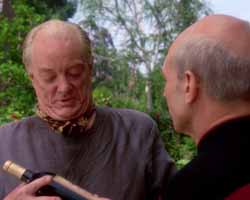 TNG s4 e2 "Family", © CBS, Paramount
TNG s4 e2 "Family", © CBS, Paramount
Where was Robert during all this family drama?
Also, did the writers not know that Picard had an older brother? Where was Robert Picard during all this drama with their parents?
And Seven of Nine has apparently regressed from any of her character development from the previous season, as she's back to mindlessly killing Borg and insisting that they "aren't human anymore". This is despite the fact that both she and Picard are case in point examples of former Borg being rehabilitated, and despite her sorrow of the destruction of the Borg Rehabilitation Project in season 1.
The lynchpin of this season is a young astronaut who suffers from crippling depression. This is despite the fact that NASA has pretty extensive screening and training processes that would either rule out someone who is not emotionally stable enough to do the job, or would train them to the point that they do the job without a second thought. This is an example of how having science and technology consultants in the writing room would help make the story more believable. [More]
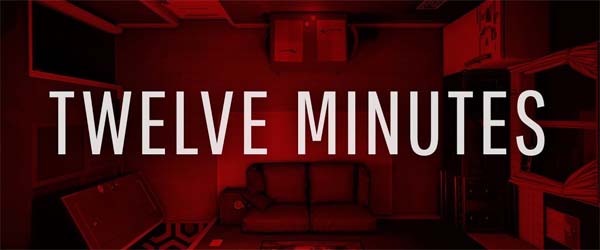
It may have taken almost 20 years after Majora's Mask, but it looks like time loop games have suddenly become an emerging fad. Not that it's a bad thing, per se. Outer Wilds has, after all, become one of my favorite games ever. Twelve Minutes is much more scaled-down and far less ambitious than Outer Wilds; it takes place entirely within a small, one-bedroom apartment, and the individual loops average 5-10 minutes instead of the 22-minute loops of Outer Wilds.
12 Minutes has a high-degree of responsiveness to player actions.
12 Minutes is also a much more straight-forward point-and-click puzzle-adventure game in a vein much more reminiscent of classic Lucasarts games. There's only a handful of interactive objects in the apartment, and each one has a variety of different uses. In this way, 12 Minutes rather explicitly telegraphs the solutions to puzzles, since there's only a handful of things that the player can even try. The options available to the player lead the player down the path to progress, and if you ever get stumped, idle conversation will often provide clues as to what you could maybe try next.
Although the seams in the facade do become evident if the player gets stuck repeating a particular loop too many times, I did find myself impressed by just how naturally reactive 12 Minutes is to player interference. The wife and cop will react believably to many things that the player might do, including some off-the-wall things. The wife might comment on weird or rude behavior by me, or the entire time loop may go in a completely unexpected direction because I chose to do something slightly different. It's a surprisingly wide and robust possibility space.
The short duration of time loops, and the relatively small amount of intractable objects really encourages lots of player experimentation. Screwing up any given loop doesn't lose a whole lot of progress, so there's very little penalty for trying some seemingly-crazy solution on a whim, and sometimes, it will even reward the player with some new piece of information that you didn't have before, or a clue to how you might proceed.
12 Minutes provides lots of subtle clues for ways to proceed.
12 Minutes is also quite good about providing clues that are subtle enough to not be obvious spoilers of what to do next, but which might still make you facepalm in retrospect "of course that's what I should have done!" What makes these clues work without feeling like they solve the game for you is that there is often multiple ways to go about testing them. The wife making an off-hand comment about needing to clean the closet is, in retrospect, an obvious clue that the player should check the closet. There is a useful object in there, but its usefulness isn't necessarily immediately obvious. What might also not be immediately obvious is that there's another way that the closet is immediately useful, it just has nothing to do with the object you found there.
[More]
If Infinity War was the Empire Strikes Back of the Marvel Cinematic Universe, then Endgame was poised to be the MCU's Return of the Jedi. RotJ was a "good enough" capstone on a legendary film series, and that's pretty much where my expectations for Endgame sat. Endgame exceeded my expectations. It's far more than just a "good enough" sequel, though it's still not as good as Infinity War.
Endgame could very easily have just been a movie about all the heroes picking themselves back up after being knocked down in Infinity War, coming together, going after Thanos, and beating him up for two hours. Then they get the Infinity Gauntlet and snap all the dead heroes and people back into existence. No harm done, happy ending for everyone.
Not the case.
Several of my friends suspected that Thanos would remain the point-of-view character, and that he, himself, would be overcome with grief and regret over having killed Gamora. That Thanos would actually be the one to undo everything, redeeming himself in a way similar to Darth Vader. That didn't happen either. The point of view has shifted completely back to our heroes -- what's left of them.
Thanos' grief is not the subject of the movie, nor does he spend the movie gloating. Grief is, however, the overarching theme of Endgame, which handles the subject with maturity and nuance -- at least, up until its morally muddled ending (more on that later). The Marvel movies have always included themes of family, and the lengths one would go for family. Endgame explores how we deal with the loss of family, the grief and depression that comes with tragedy, the trauma and guilt of failing to protect those you care about. It's powerful stuff, and it pulls no punches.
The end credits went full-blown Star Trek VI.
And I totally cried when the movie went full-blown Star Trek VI with its end credits. It's too bad they didn't include the Stan Lee marvel logo that was included in Captain Marvel. This being the capstone MCU movie that everyone is going to see, I feel that tribute would have served this movie well. Or maybe put that tribute at the end of the movie, along with the other credits. Ah well.
It's hard to talk any more about this movie without going into spoiler territory. So I'm going to start with minor spoilers and work my way up to the more major ones. If you haven't seen the movie yet, then you can close this page now and know that I give it my fullest recommendation. Otherwise, feel free to read on, but know that things are going to get increasingly spoiler-y as I go on. Feel free to stop if you feel like you're about to read something you don't want to hear.
The remaining heroes must deal with the grief and guilt of having failed to stop Thanos. [More]
601d3ac2-4081-4c66-8479-582e4b972f43|2|5.0
Tags:Avengers, Avengers: Endgame, Marvel, Marvel Comics, Thanos, Infinity Stone, Infinity Gauntlet, Captain Marvel, Captain America, Iron Man, Hulk, Thor, Black Widow, Ant Man, Hawkeye, Rocket Racoon, Nebula, time travel, paradox, grief, depression, trauma, beer belly, Star Trek VI: the Undiscovered Country
A couple weeks ago, I heaped praise upon the Spectacular Spider-Man TV show, saying that it "might be the best media adaptation of Spider-Man, period!". I still believe that holds true, but Sony's Into the Spider-Verse definitely gives Spectacular a run for its money.
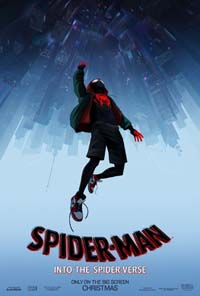
Spider-Verse isn't really an adaptation of any of the Spider-Man comics. Not the original Amazing comics, or even the more recent Ultimate comics. It's a completely original story featuring the modern Ultimate Spider-Man, Miles Morales, the son of an hispanic nurse and a black cop in New York. So in that sense, Spectacular remains the most faithful adaptation of the original 60's and 70's, Stan Lee and Steve Ditko comics featuring Peter Parker. I was kind of hoping to see a Josh Keaton Spectacular cameo in this film, but no such luck. Damnit, Sony, bring back Spectacular Spider-Man! Make it happen!
I also said in the Spectacular review that Spider-Man (and perhaps all comic adaptations) are best-suited to television shows in which the long-form, character-driven storytelling of comics can be allowed to play out. Into The Spider-Verse, however, proves that Spider-Man (and perhaps all comic adaptations) also work much better in animation! The animation here is fantastic. The images are crisp and vibrant, and they really "pop" to the point that the movie almost looks 3-D without actually watching it in 3-D. The action is fluid and kinetic. The character designs and costumes are all interesting (especially Spider-Gwen, Doctor Octopus, and Prowler). Kingpin's massive, hunchbacked visage kind of stands out as odd, considering that all the other characters have somewhat realistic body proportions. Everything else, however, looks really good!
Seriously, this movie's visuals will blow you away. I'm talking, like, remember how you felt when Beauty and the Beast, The Lion King, and Toy Story came out. That's how good this movie looks.
Animation if crisp, vibrant, fluid, and kinetic.
Not only is it pretty to look at from a technical level, it's also ingeniously-imaginative. There's some reality-warping, dimension-hopping dreamscapes that put Doctor Strange and Inception to shame. Most of the action is semi-realistically drawn and animated, but certain action scenes go extra comic-bookey with brief still-images of comic-like panels, complete with sound effects and speech bubbles drawn on the screen. Peni Parker, Noir, and Spider-Pig all have their own distinct animation styles that blend in flawlessly with the rest. Peni and her robot mech are from a future Japan, and are drawn and animated in a distinctively anime style. Noir is drawn like penciled-in black-and-white. Spider-Pig is full-blown Merry Melodies cartoon.
... [More]
acbac695-9662-4545-b638-7e6155175600|0|.0
Tags:Spider-Man, Into the Spider-Verse, Sony/Columbia Pictures, animation, Peter Parker, Miles Morales, Gwen Stacy, Ultimate Spider-Man, Spider-Gwen, Spider-Man Noir, Peni Parker, Spider-Pig, May Parker, Kingpin, Prowler, parallel dimensions, time travel, Stan Lee, Steve Ditko, Logan
|

| 12 | | | | | | | 60 | | 11 | | | | | | | 55 | | 10 | | | | | | | 50 | | 09 | | | | | | | 45 | | 08 | | | | | | | 40 | | 07 | | | | | | | 35 | | 06 | | | | | | | 30 | | 05 | | | | | | | 25 | | 04 | | | | | | | 20 | | 03 | | | | | | | 15 | | 02 | | | | | | | 10 | | 01 | | | | | | | 05 |
|